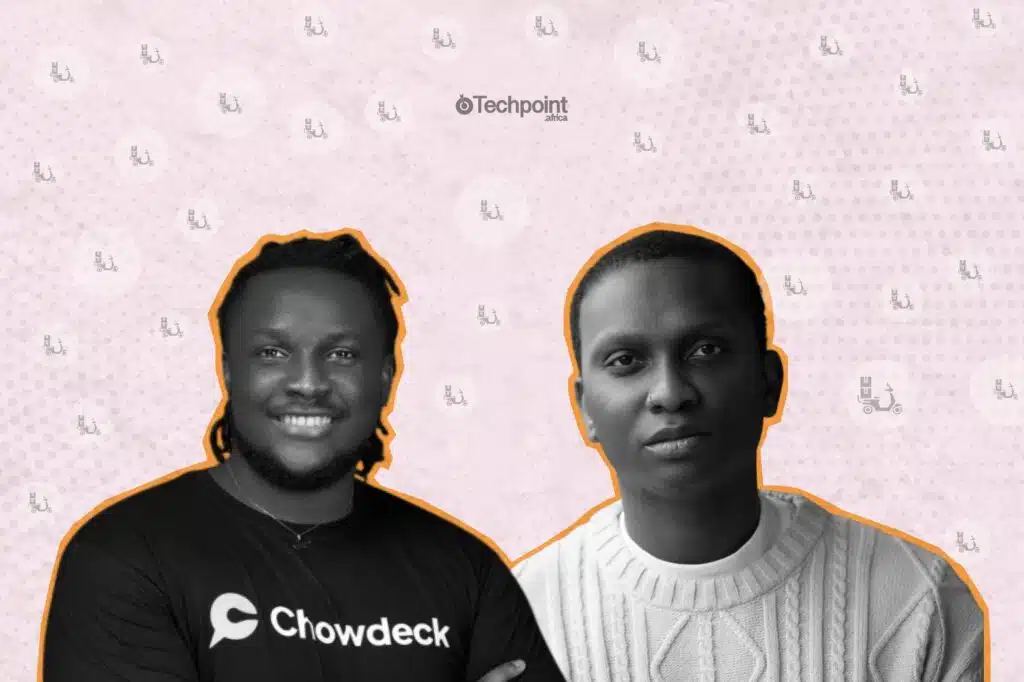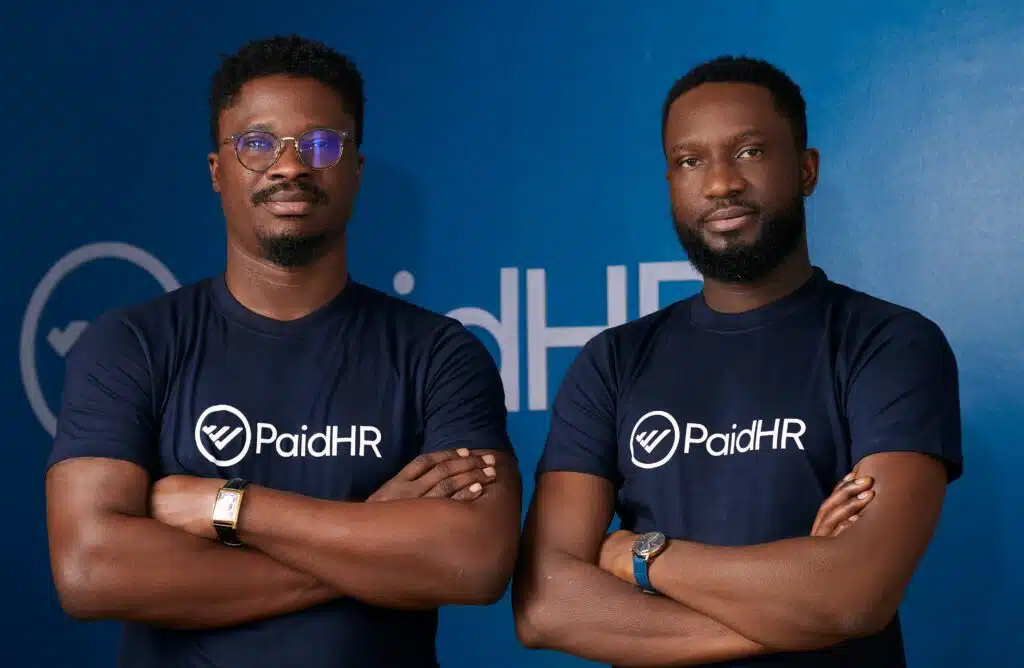Cześć,
Victoria from Techpoint here,
Here’s what I’ve got for you today:
- Takealot rakes in R15B as it gears up for Amazon battle
- AI is helping Rwanda build smarter clinics
- Chowdeck acquires Mira to go beyond delivery
- PaidHR bags $1.8M to grow cross-border payroll
Takealot rakes in R15B as it gears up for Amazon battle

Takealot is still holding strong as South Africa’s eCommerce champ and despite all the buzz around Amazon’s arrival, it’s not backing down anytime soon. In its latest financials (for the year ending March 2025), Naspers says Takealot Group raked in nearly R15 billion in revenue, up over R2.5 billion from the previous year. That’s a 15% jump in local currency terms.
The group, made up of Takealot.com and food delivery app Mr D, saw solid growth in the second half of the year, thanks in part to its TakealotMore loyalty programme. The result? More frequent shopping, more orders, and more happy customers, according to Naspers.
Takealot.com alone grew revenue by 17% to R12.9 billion, with gross merchandise value (GMV) up 13%. Mr D, on the other hand, brought in R2.1 billion in revenue — not bad at all — and saw its grocery GMV soar by a massive 81%. The delivery app also improved its earnings, with aEBIT jumping to R73.1 million.
That said, the overall group wasn’t totally in the green. Adjusted EBIT fell to -R219.4 million, largely due to increased spending on infrastructure and marketing. Why? Naspers didn’t name names, but it’s clearly preparing for the Amazon showdown in South Africa.
To beef up its capabilities, Takealot sold off Superbalist.com and snapped up M24 Logistics, both part of a strategy to streamline operations and build a full-service eCommerce ecosystem. It’s even launching a new logistics unit called Takealot Fulfilment Solutions to support this goal.
On the tech side, AI is taking centre stage. From smarter stock positioning to fraud detection and GenAI-powered productivity, Naspers says Takealot is going all-in on artificial intelligence to stay competitive. With online shopping penetration still only around 5% in SA, there’s room to grow, and Takealot clearly wants to be the one leading the charge.

Victoria Fakiya – Senior Writer
Techpoint Digest
Stop struggling to find your tech career path
Discover in-demand tech skills and build a standout portfolio in this FREE 5-day email course
AI is helping Rwanda build smarter clinics

For years, accessing healthcare in Rwanda meant a long, exhausting walk, sometimes up to 95 minutes, just to reach the nearest clinic. It was even worse for pregnant women and sick children in rural areas. That’s why the Rwandan government launched an ambitious plan: bring healthcare within 30 minutes of every citizen.
So far, they’ve made real progress. By 2020, the average travel time to a health facility had been slashed in half. But hitting the next milestone, bringing that average below 25 minutes, is proving tougher. It’s not just about building more clinics; it’s about building them in the right places.
Enter Sands Technologies. The health innovation company is teaming up with Rwanda’s Ministry of Health, using artificial intelligence and satellite data to figure out exactly where new health centres should go. At a recent Google Research Africa event, Sands’ Anisa Ragalo broke it down: “We’re using building data, road maps, and population estimates to design smarter healthcare systems.”
At the heart of it all? Google’s Open Buildings dataset. It maps hundreds of millions of buildings across Africa using machine learning. Sands is turning that data into a geospatial tool that shows, down to the last block, which communities are covered and which are not. Green dots mean access. Red dots mean urgent need.
The system even estimates how many people live in a given area and what kind of facility they need. Maternity ward? Lab services? Minor surgery? “It’s no longer about throwing a clinic in a district,” Ragalo said. “We can now zoom in, neighbourhood by neighbourhood, to design exactly what each area needs.”
Curious about how Google’s Open Buildings dataset works and how it’s reshaping healthcare in Rwanda? Read Bolu’s latest story to find out more.
Chowdeck acquires Mira to go beyond delivery

Chowdeck just made a bold move. It has acquired Mira, a young restaurant management startup, to dig deeper into the operations side of the food business. You probably know Chowdeck as the delivery company zipping food across Nigerian cities and, recently, Accra. But now, they want to be more than your delivery plug. They’re going behind the counter to help restaurants manage the chaos.
CEO Femi Aluko says it plainly: Chowdeck has focused on the customer side for too long. Now it’s time to give vendors — restaurants, supermarkets, pharmacies — some love. The big issue they’re solving? Inventory headaches. And Mira, founded by ex-Flutterwave design VP Ted Oladele, is bringing the tools to make it happen.
Mira’s system lets restaurant customers order and pay via QR codes, while giving business owners access to backend tools like inventory tracking, sales dashboards, and customer insights. Over 500 businesses already use it, and Mira even sells POS hardware. With the acquisition, Oladele is now Head of Product at Chowdeck, and some Mira staff are coming along for the ride.
This isn’t just about expanding features. It’s about Chowdeck owning more of the food ecosystem. Until now, it’s been all about delivery. But with Mira, it can now help restaurants from the moment ingredients are logged in to the point they’re served. In a market as fragmented as Nigeria’s, that’s a power move.
Of course, it won’t be easy. Restaurants are notoriously slow to switch software, and support expectations are higher. Competitors like Vendease know this struggle. But Chowdeck may have an edge: restaurants already know and trust them for delivery, so upgrading to their in-house systems could feel like a natural next step.
Still, this changes Chowdeck’s game entirely. It’s no longer just a delivery startup; it’s angling to become the tech backbone of the food and hospitality industry in Africa. If this works, don’t be surprised if they start rolling out tools for grocery and pharma vendors too. The question now is: how far up the supply chain are they willing to go?
PaidHR bags $1.8M to grow cross-border payroll

PaidHR, a Nigerian HR tech startup, just raised $1.8 million in seed funding, and it’s putting that money to work. The round, led by Accion Venture Lab, will help the company double down on its growing cross-border payroll product, which already contributes 15% of its revenue. Other backers in the oversubscribed round include Zrosk, Chui Ventures, and Zedcrest Capital, pushing total funding to $2.3 million.
In case you missed it, PaidHR launched the cross-border feature in 2024 to help businesses navigate Nigeria’s currency devaluation. It’s since become a hit. CEO and Co-founder Seye Bandele says it’s just one part of a bigger plan to build HR solutions that actually fit the African market, not retrofitted foreign tools or clunky spreadsheets.
Founded by Bandele and CTO Lekan Omotosho, PaidHR is already working with nearly 300 businesses across Nigeria, Kenya, and South Africa. It serves companies like MAX, Busha, Bamboo, and Risevest, handling everything from payroll to HR management. And it’s not just for big names. Their core focus remains Africa’s millions of small businesses, which often lack aff0rdable, local HR tools.
PaidHR has rolled out a few key products recently, including earned wage access (which let employees get up to 50% of their pay early) and an employee wallet for things like bill payments and USD transfers. In 2024 alone, over ₦150 million was disbursed through the earned wage platform. According to Bandele, it’s helping employees stay afloat without turning to payday loans.
The wallet product, launched in April 2025, raised eyebrows with some critics calling it a fintech side hustle disguised as HR. But Bandele insists it’s all part of the plan. “We’re not a fintech. We’re solving people’s problems through HR,” he says.
Want to learn more? Read Chimgozirim’s story for all the details.
In case you missed it
- Flutterwave secures Cameroon licence as part of Africa-wide expansion
What I’m watching and reading
- THIS Is The Fastest Way To Get Dementia… | The Brain Doctor, Dr Ann Mckee
- Why Is Lung Cancer in Non-smokers on the Rise?
Opportunities
- MasterCard is recruiting a Head of Impact Labs. Apply here.
- Jumia is hiring a Chief Marketing Officer (Pipeline). Apply here.
- Sun King is looking for a Workforce Planning Analyst, Nigeria. Apply here.
- Building a startup can feel isolating, but with Equity Merchants CommunityConnect, you can network with fellow founders, experts, and investors, gaining valuable insights and exclusive resources to help you grow your business. Click here to join.
- Help us make Techpoint better for you! Your feedback shapes what comes next (your responses may potentially save my job. A bit dramatic, but still). It will only take 30 seconds to tell us what works and what doesn’t. Fill it here.
- To pitch your startup or product to a live audience, check out this link.
- Have any fresh products you’d like us to start selling? Check out this link here.
- Follow Techpoint Africa’s WhatsApp channel to stay on top of the latest trends and news in the African tech space here.
Have a lovely Tuesday!
Victoria Fakiya for Techpoint Africa.










